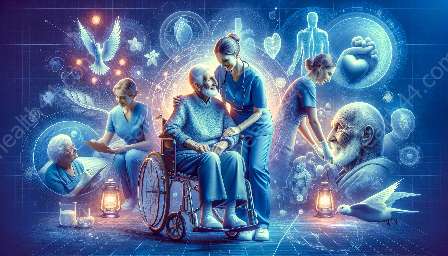As seniors age, maintaining proper nutrition and hydration can present unique challenges that impact their overall health and well-being. This is particularly important in geriatric nursing and within the broader nursing field, as addressing these challenges requires specialized care and understanding of the aging process.
The Impact of Aging on Nutrition and Hydration
Seniors often face a myriad of factors that can affect their nutritional and hydration status. These may include decreased appetite, changes in taste and smell, decreased mobility, chronic health conditions, medication side effects, and cognitive impairments, among others. As a result, the ability to meet their dietary and fluid needs becomes more complex and may require special attention from healthcare professionals. In geriatric nursing, understanding these challenges is essential for providing effective care.
Psychological and Social Factors
Psychological and social factors also play a significant role in seniors' nutritional and hydration challenges. Feelings of loneliness, depression, and social isolation can impact their desire to eat and drink, while financial constraints may limit their access to nutritious foods and beverages. In geriatric nursing, addressing these factors requires a holistic approach to care that considers not only physical health but also the emotional and social well-being of seniors.
Role of Geriatric Nursing in Addressing Nutritional and Hydration Challenges
Geriatric nursing plays a crucial role in addressing the challenges of nutrition and hydration in seniors. Nurses specializing in geriatric care are trained to assess the unique needs of elderly individuals, provide tailored nutritional counseling, and collaborate with other healthcare professionals to develop comprehensive care plans. They also play a key role in educating seniors and their families about healthy eating and drinking habits as part of proactive preventive care.
Strategies for Supporting Healthy Eating and Drinking Habits
There are various strategies that geriatric nurses and nursing professionals can employ to support healthy eating and drinking habits in seniors. These include:
- Nutrition Assessment: Conducting thorough nutritional assessments to identify individual needs and preferences.
- Meal Planning: Developing customized meal plans that consider dietary restrictions, food preferences, and cultural backgrounds.
- Nutritional Counseling: Providing guidance on maintaining a balanced diet, managing specific health conditions, and addressing age-related nutritional concerns.
- Hydration Monitoring: Monitoring fluid intake and identifying strategies to ensure proper hydration, especially for seniors with mobility or cognitive challenges.
- Community Resources: Connecting seniors with community resources, such as meal delivery services or senior centers, to support access to nutritious meals and social engagement.
- Family Involvement: Involving family members in the care process and providing them with education and resources to support their loved ones' nutritional and hydration needs.
The Importance of Collaboration
Collaboration among healthcare professionals is essential in addressing the nutritional and hydration challenges of seniors. In geriatric nursing, interdisciplinary teamwork with dietitians, physicians, occupational therapists, and social workers is crucial for developing holistic care plans that address the multifaceted needs of elderly individuals. Additionally, ongoing communication and coordination ensure that seniors receive comprehensive support across various aspects of their health and well-being.
Embracing Innovation and Technology
The use of innovative technology can also aid in addressing nutritional and hydration challenges in seniors. From mobile applications that track food and fluid intake to telehealth platforms that allow for remote nutrition counseling, incorporating technology into geriatric nursing practices can enhance the efficiency and effectiveness of care delivery. However, it's important to ensure that seniors and their caregivers have the necessary support and resources to embrace these technological advancements.
Conclusion
In conclusion, the challenges of nutrition and hydration in seniors require thoughtful consideration and specialized care, particularly in the field of geriatric nursing. By understanding the unique factors that impact seniors' dietary and fluid intake, implementing tailored strategies, fostering collaboration among healthcare professionals, and embracing innovation, nurses and other healthcare providers can work towards improving the nutritional and hydration status of elderly individuals, ultimately contributing to their overall health and quality of life.


